Nigeria's rise in global football prominence has been driven by investments in football infrastructure and the success of the country's players in top European leagues.
The country successfully hosted the Africa Cup of Nations in 1980 and 2000. These would not have been possible without the biggest stadiums in Nigeria hosting some memorable matches.
However, with only two of Nigeria's many stadiums currently approved by FIFA, this post delves into the country's largest football grounds, paying particular attention to their seating capacities.
Continue reading to discover how these stadiums compare to some of the largest stadiums in Africa.
A table of the biggest stadiums in Nigeria
| Stadium | Team | Capacity |
|---|---|---|
| Mashood Abiola National Stadium |
Nigeria National Football Team |
60, 491 |
| Jos International Stadium |
Plateau United F.C. |
60,000 |
| Lagos International Stadium |
Nigeria National Football Team |
55,000 |
| Adokiye Amiesimaka Stadium |
Rivers United F.C. |
40,000 |
| Muhammadu Dikko Stadium |
Katsina United F.C. |
35,000 |
| Godswill Akpabio International Stadium |
Akwa United |
30,000 |
| Confluence Stadium |
Kogi United/Confluence Queens |
25,000 |
| Obafemi Awolowo Stadium |
25,00 |
|
| Teslim Balogun Stadium |
First Bank F.C. |
24, 325 |
| Nnamdi Azikiwe Stadium |
Enugu Rangers |
22,000 |
| Stephen Keshi Stadium |
22,000 |
|
| Warri Township Stadium |
Warri Wolves F.C. |
20,000 |
From the preceding, let's delve into the details of the biggest stadiums in Nigeria.
Moshood Abiola National Stadium
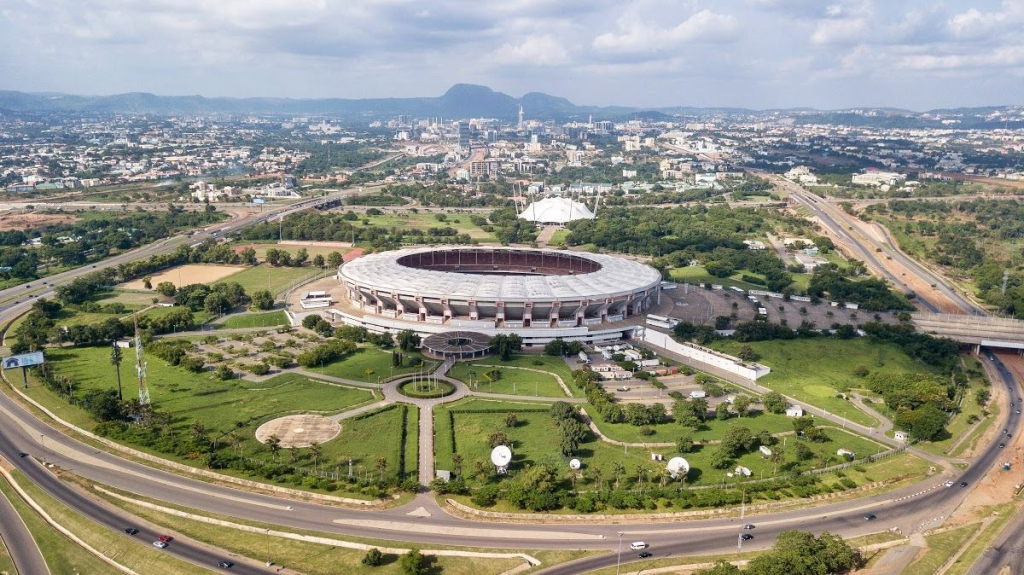
With a seating capacity of 60,491, the Moshood Abiola National Stadium, Abuja, stands as the largest sporting facility in Nigeria and one of the most expansive stadiums on the African continent.
Located in the nation’s capital, the multi-purpose venue serves as the traditional home of the Super Eagles, hosting Nigeria’s national team matches, while also doubling as a major hub for cultural, social and religious gatherings.
Originally built to host the 2003 All-African Games, the stadium then, known as the National Stadium, Abuja was conceived as a symbol of Nigeria’s sporting ambition and one of the most expensive stadium projects ever undertaken in the world at the time of its construction.
In June 2019, the facility was officially renamed by former President Muhammadu Buhari in honour of late politician Chief M.K.O. Abiola, a key figure in Nigeria’s democratic history.
One of the most iconic moments in the stadium’s history came on 1 June 2008, when an estimated 60,000 spectators filled the stands as Nigeria hosted South Africa in an international fixture. Given the long-standing rivalry between the Super Eagles and Bafana Bafana, the record attendance was hardly a surprise.
Despite its prominence, the Moshood Abiola National Stadium has faced maintenance challenges and periods of neglect, forcing the Super Eagles to relocate. To address this, the Federal Government, through the NSC, plans to revive the stadium and explore private investment. The proposed 2026 budget allocates around ₦24.64 billion ($16 million) for renovation, aiming to restore the stadium as a flagship of Nigerian sports infrastructure
Jos International Stadium
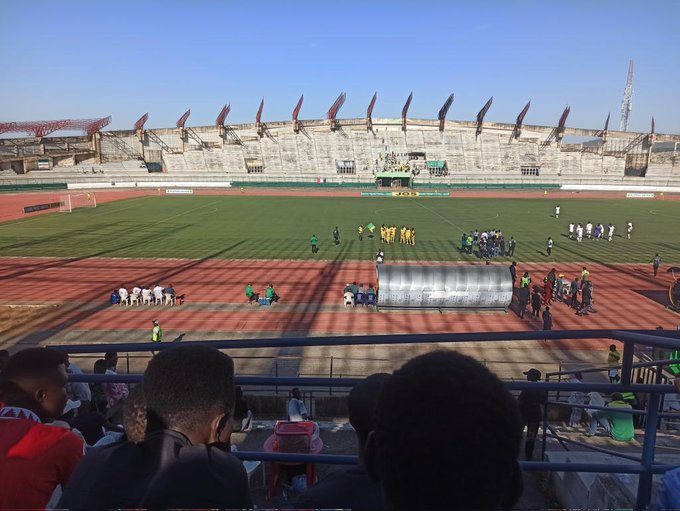
With a capacity of 60,000, Jos International Stadium is the second-largest sporting facility in Nigeria. The venue was opened in 2018, paving the way for a new future in Nigeria's football culture.
Jos International Stadium has hosted several teams in Nigeria's Super League, including Plateau United of the National Professional Football League. Plateau United sometimes play home games at the Rwang Pam Stadium in Jos, Nigeria, a venue with a much lower seating capacity of 15,000.
Lagos International Stadium
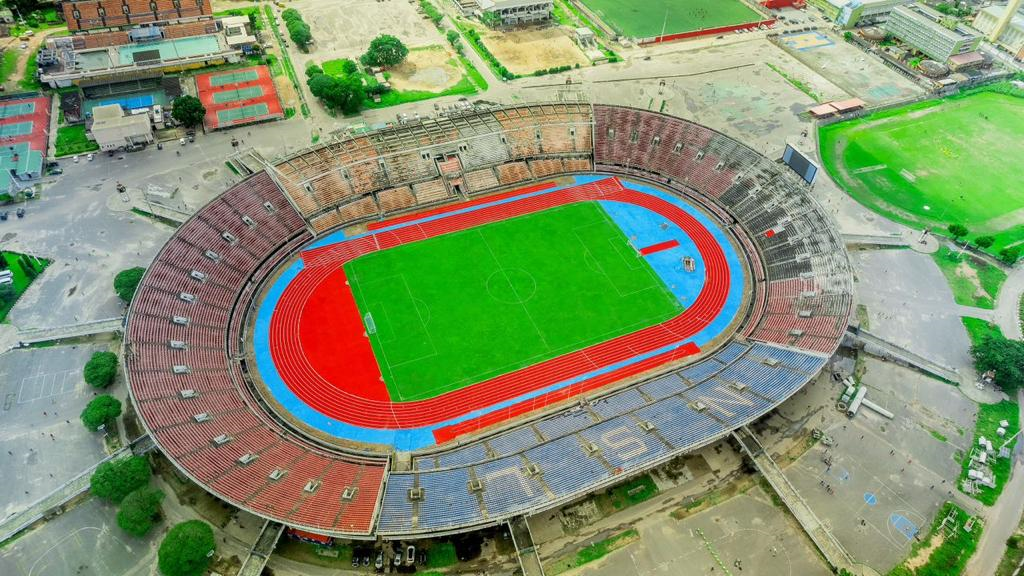
The Lagos International Stadium holds the third spot on our list of the largest stadiums in Nigeria. It was constructed in 1976 due to the strong passion for football among Nigerians.
Additionally, being the Federal capital at the time, Lagos ensured there was strong economic support for the project.
Once the home of the Super Eagles and host of the 1980 African Cup of Nations final, the stadium has largely fallen into disrepair since 2004, though it is still used for athletics, as well as social and religious events.
The capacity of Lagos International Stadium was originally 55,000, but it has since been reduced to 45,000.
Adokiye Amiesimaka Stadium
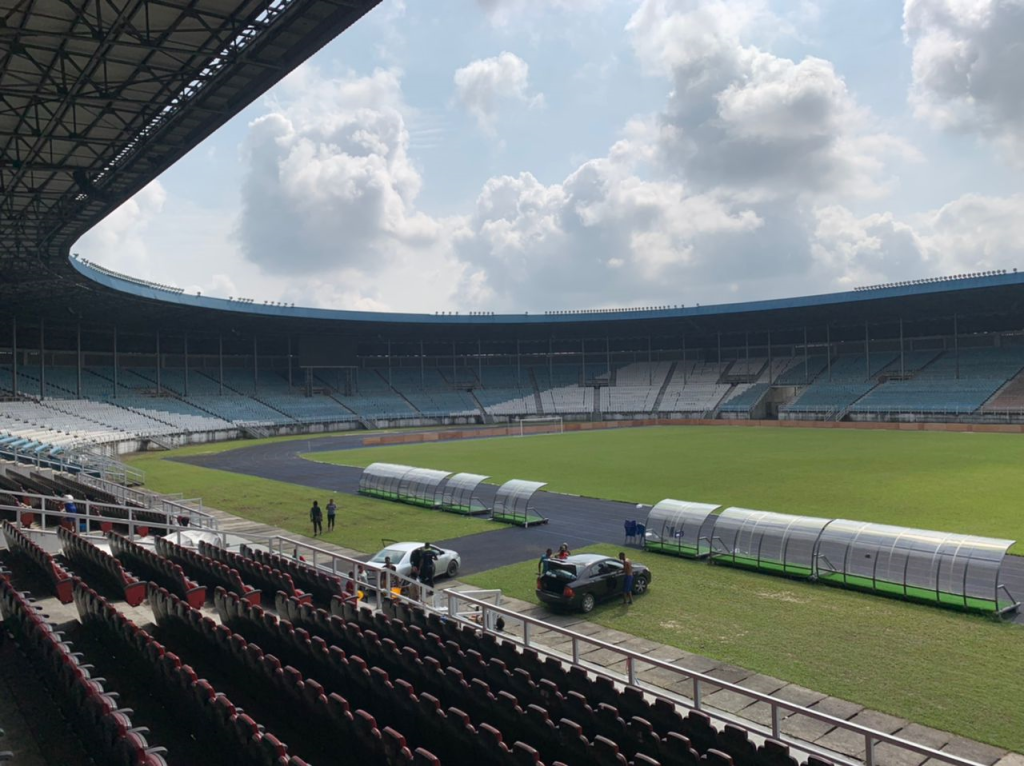
Adokiye Amiesimaka Stadium is a multipurpose sporting facility located in Port Harcourt, Nigeria. It is undoubtedly one of the biggest football stadiums in the country.
The venue currently serves as the home ground for Rivers United in the Nigeria Professional Football League. It previously hosted home matches for Dolphins, a team that has since merged with Sharks F.C. to form Rivers United F.C.
Adokiye Amiesimaka Stadium, named after a former player, Adokiye Amiesimaka, who was part of the 1980 AFCON-winning squad, has a capacity of 35,000.
The stadium was opened in July 2015 during a well-attended Olympic qualifier match between Nigeria and Congo. The Super Eagles won the encounter 2-1.
Muhammadu Dikko Stadium
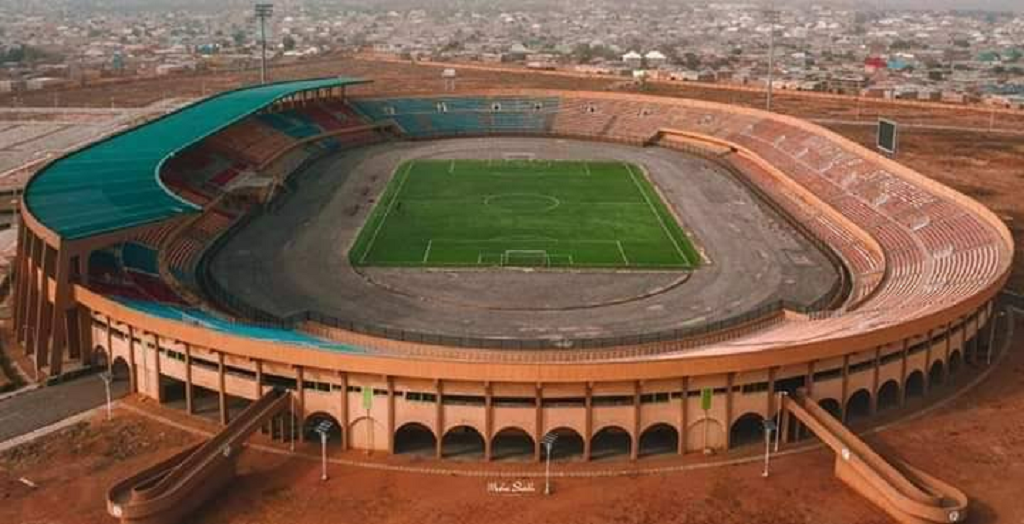
The next on our list of the biggest stadiums in Nigeria is the Muhammadu Dikko Stadium, which is currently the home ground for Katsina United F.C. The stadium has a capacity of at least 30,000 seats. Muhammdu Dikko Stadium was designed by Monimichelle Sports Facility Construction Limited, a company incorporated in Lagos, Nigeria.
Construction of the Muhammadu Dikko Stadium commenced in the early 1990s, facing several delays along the way. It was to be completed later in 2013 and was first named Karkanda Stadium.
However, in 2016, the venue was named after a 20th-century Emir of the state, Muhammadu Dikko.
Godswill Akpabio International Stadium
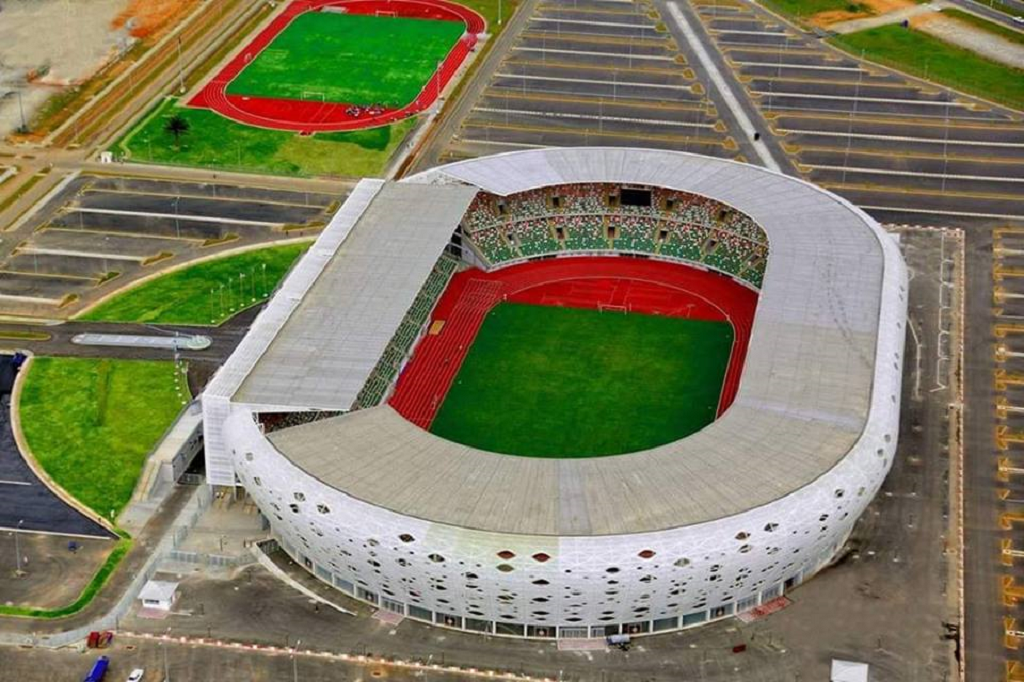
Godswill Akpabio is one of the biggest stadiums in Nigeria, with a capacity of 30,000. Formerly known as Akwa Ibom International Stadium, it often hosts national team matches. It is currently the home ground for Akwa United, a team that plays in Nigeria's top flight.
Construction of the Godswill Akpabio Stadium began in 2012 when the contract was awarded and was completed two years later. The venue features state-of-the-art facilities, with its design inspired by the Allianz Arena.
Today, the stadium also serves as a home for the Nigerian Super Eagles and hosts a variety of social, cultural, political, and religious events.
Confluence Stadium
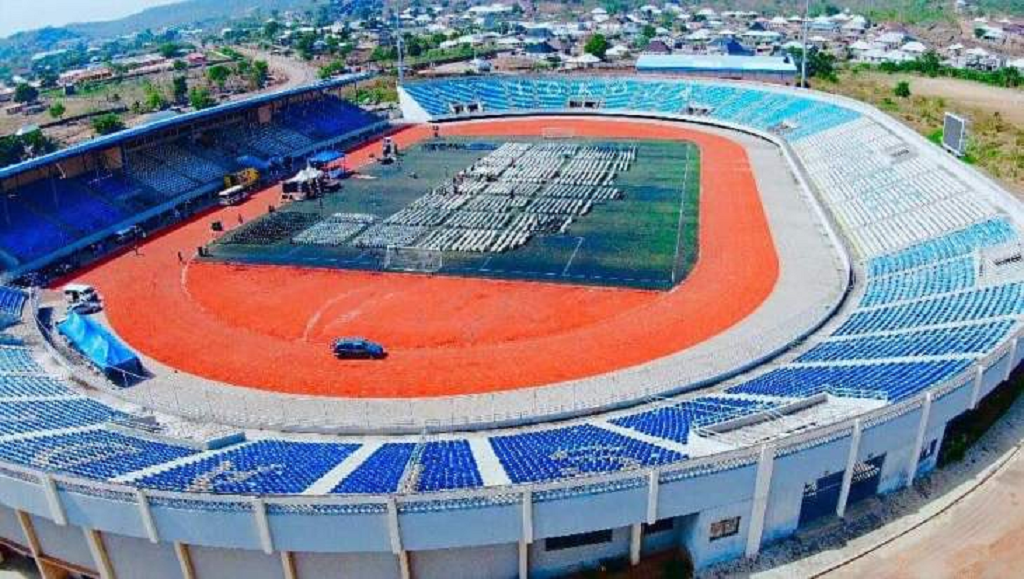
Now, in Lokoja, Kogi State, Nigeria, is Confluence Stadium, which makes it to this list of the biggest stadiums in Nigeria. The ground is used by Kogi United and Confluence Queens from the National League and Women's Premier League, respectively.
The venue boasts a seating capacity of 25,000, making it one of the biggest stadiums in Nigeria.
Confluence Stadium was constructed in 1998 and consequently upgraded to its current state, featuring modern sporting facilities. The venue previously served as the home ground for the Niger Tornadoes of the NPFL. It often hosts several religious and cultural events.
Obafemi Awolowo Stadium
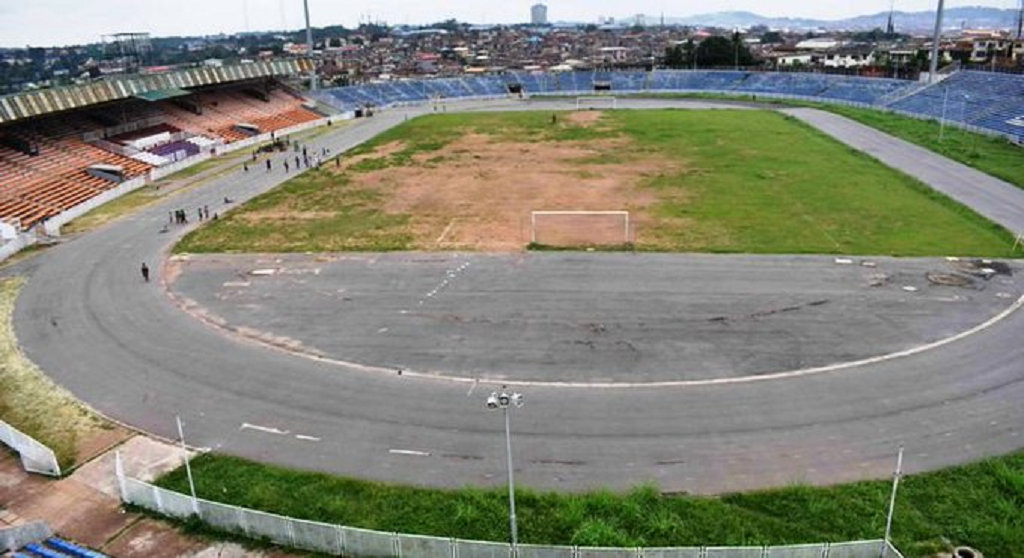
Obafemi Awolowo Stadium in Ibadan, Nigeria, is a modern sporting facility and is one of the biggest stadiums in Nigeria. The venue boasts a seating capacity of 25,000.
Obafemi Awolowo Stadium's location in Ibadan, Nigeria's third-most populous city, makes it ideal for sporting activities, especially football.
The venue was initially named Liberty Stadium to commemorate the country's independence. However, it was renamed to Obafemi Awolowo Stadium in 2010 to honour a chief who was the premier of the Western Region at the time.
The stadium has hosted significant matches and events, including the FIFA World Youth Championship in 1999 and the African Cup of Nations in 1980.
Teslim Balogun Stadium
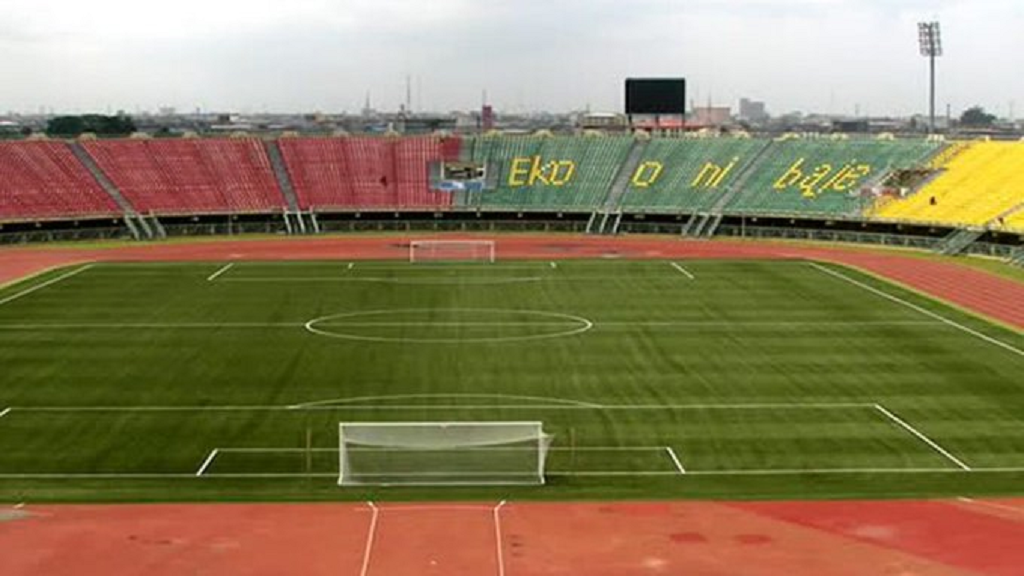
Teslim Balogun Stadium is a versatile sports facility in Nigeria and one of the largest venues in the country. It is located in Surulere, a local government area in mainland Lagos. The stadium, which opened in 2007, has a capacity of 24,352.
The venue hosts matches for Nigeria's national rugby team and occasionally stages international football tournaments, such as the FIFA U-17 World Cup in 2009. In December 2012, it served as the main ground for the National Sports Festival.
The Lagos State Government is currently conducting extensive renovations to transform Teslim Balogun Stadium into a modern, world-class arena. Key upgrades include new roofing, complete cladding, improved spectator stands, pitch rehabilitation, and the addition of modern floodlights to meet international standards.
Nnamdi Azikiwe Stadium
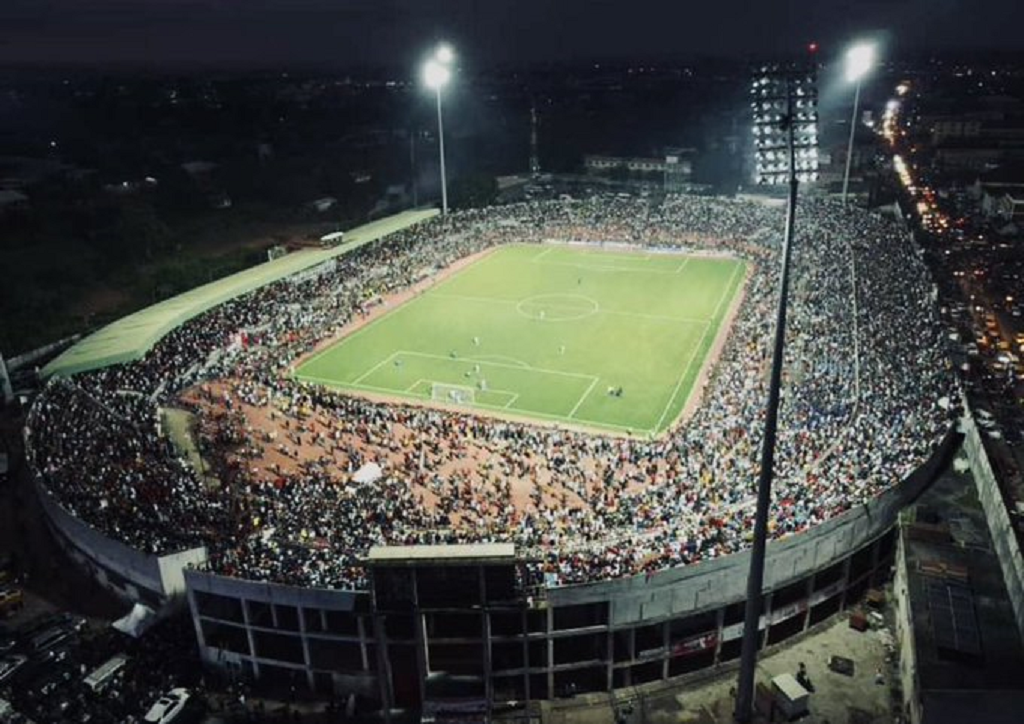
Nnamdi Azikiwe Stadium in Enugu State is also included in this list of the biggest stadiums in Nigeria. The venue, which opened in 1959, currently hosts home matches for Enugu Rangers, a formidable outfit in Nigeria's Professional Football League. It was renovated in 1970.
Nnamdi Azikiwe Stadium, named after Nigeria's first president, has a capacity of 22,000. It is one of the oldest stadiums in Nigeria and boasts a rich history of hosting colourful cultural, political, and sporting events.
In 1999, Nnamdi Azikiwe Stadium hosted several FIFA World Youth Championships. Nigeria lost 3-1 to Mali in a quarterfinal clash at the venue. Another notable football tournament that has taken place at the Mnadmdi Azikiwe Stadium is the FIFA U-17 World Cup in 2009.
FUN FACT:
🇳🇬🇳🇬Jeriq made history by becoming the first Nigerian rapper to sell out two stadium shows within a single month—filling the 20,000-plus-capacity Chuba Ikpeazu Stadium in Onitsha, followed shortly by a 30,000-plus-capacity show at Nnamdi Azikiwe Stadium in Enugu🩵🩵 pic.twitter.com/fVTBBgViTj
— HIP-HOP CABIN (@hiphopcabin) September 4, 2025
Stephen Keshi Stadium
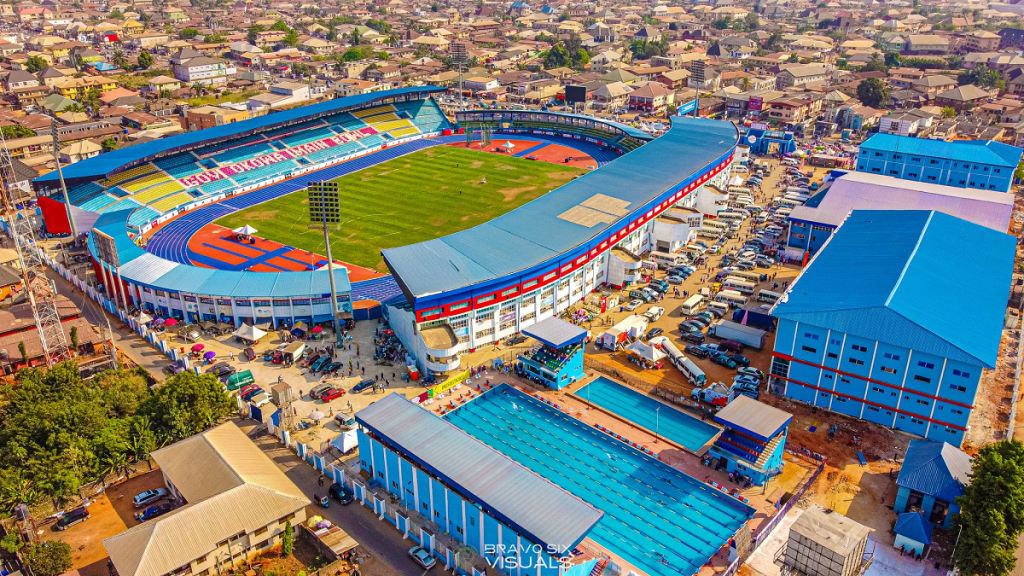
Stephen Keshi Stadium is a multi-purpose ground in Asaba, Delta State, Nigeria. It was initially named Asaba Township Stadium and is a municipal property.
With a capacity of 22,000, Stephen Keshi Stadium is on par with the Mnadi Azikiwe Stadium in terms of capacity but not as richly endowed with history as the latter. The stadium was renamed Stephen Keshi Stadium to honour a popular Nigerian football player who died in 2016.
The venue was commissioned in 2018 to host the African Athletics Championships the same year. Today, it is undoubtedly one of the biggest stadiums in Nigeria.
Warri Township Stadium
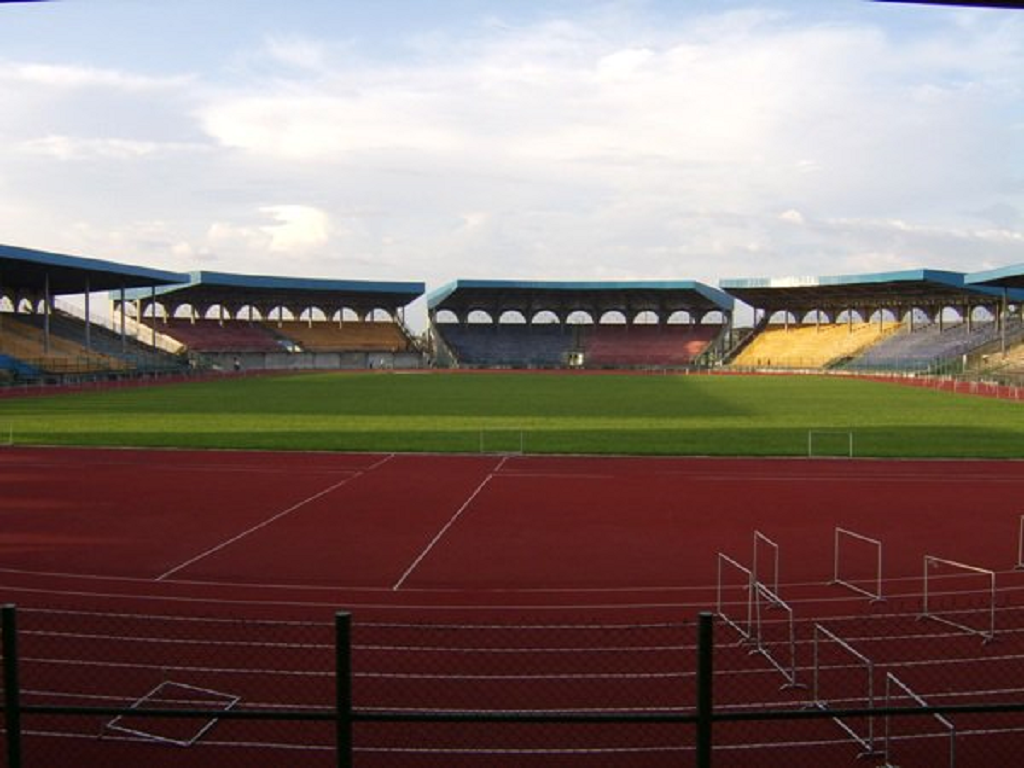
Warry Wolves FC, a team in the Nigeria National League, play their matches at Warry Township Stadium. The multi-purpose venue boasts a capacity of 20,000.
Some of the most notable tournaments held at the FIFA-approved venue include the 2009 FIFA U-17 World Cup and the 2013 All-African Youth Athletics Championships. It also hosted the 2006 Women's African Football Championship. The stadium is currently undergoing renovations to improve its facilities.
Best stadium in Africa
Africa is home to some of the best football stadiums, many of which meet FIFA standards. From the West to the East and North to the South, the continent boasts a rich football culture, supported by world-class stadiums.
However, despite being a football powerhouse in Africa, only a few of Nigeria's stadiums are on par with top-rated pitches across the continent. Let's explore some of them.
FNB Stadium, South Africa
FNB Stadium, designed in the shape of a traditional African calabash, is a state-of-the-art facility that ranks among the world's best pitches.
It hosted the 2010 FIFA World Cup and remains an iconic venue to this day. Significant investments were made in 2009 in preparation for the World Cup, increasing the stadium's value to $440 million.
This investment made FNB Stadium one of the most expensive stadiums in the world. During the 2010 World Cup, the football ground was known as Soccer City.
The stadium features executive suites, underground parking for 4000 VIP vehicles, a museum for football enthusiasts, hospitality suites and executive lounges. With these features and a seating plan that keeps fans close to the pitch, FNB Stadium offers an electrifying matchday experience.
New Administrative Stadium, Egypt
Situated in Egypt's New Administrative Capital, this stadium is a modern architectural wonder and a premier football venue in Africa.
The New Administrative Stadium is now the second-biggest football venue on the continent and features a breathtaking bowl design. The 93,000-capacity stadium boasts world-class facilities, including two indoor halls, an Olympic-sized swimming pool, and a dedicated training ground.
Access to the ground is currently very limited due to ongoing construction work in and around the stadium. However, initial glimpses reveal that the stadium is equipped with cutting-edge LED lighting technology and is part of a larger sports complex located at the heart of Egypt's new city.
Notable features of the New Administrative Stadium include a high-end sound system and a jumbotron that provide an immersive stadium experience on matchdays.
Godswill Akpabio International Stadium, Nigeria
Although the seating capacity of Godswill Akpabio International Stadium is nearly half that of the largest stadium in Nigeria, its futuristic design makes it an exceptional sporting facility.
Formerly known as Akwa Ibom International Stadium, Godswill Akpabio International Stadium boasts exceptional facilities, including a presidential suite, two electronic scoreboards, and a fully equipped medical centre. Other outstanding features include a 5000-capacity park, a 700-capacity car park and a media centre.
Ibn Batouta Stadium, Morocco
As Morocco prepares to co-host the 2030 World Cup, the country has some of the best football stadiums in Africa. The Ibn Batouta Stadium in Tangier meets FIFA standards for hosting international tournaments.
The multi-use venue mostly hosts football matches and has a huge capacity of 65,000.
Ibn Batouta Stadium stands out as a world-class venue, thanks to features such as undersoil heating, VIP lounges and medical facilities.
The 87,000-capacity venue is one of the 2025 AFCON stadiums and will also host some games during the 2030 FIFA World Cup.
Prince Moulay Abdellah Stadium
The recently completed Prince Moulay Abdellah Stadium stands out as a world-class sporting facility. It is currently one of the best stadiums in Africa, thanks to its cutting-edge design and sporting facilities.
Located in the capital Rabat, the 68,700-capacity national stadium hosted an inaugural match on 5 September 2025. Morocco defeated Niger 5-0 in the FIFA World Cup Qualifier.
🖼 Prince Moulay Abdellah Stadium in #Rabat , designed by @Populous , and inspired by palm fronds.🌴🔜🏟🇲🇦 pic.twitter.com/9rpn5X1AIv
— World Stadiums🏟 (@Worldstadium_EN) August 24, 2025
Cairo International Stadium
Cairo International is not only home to one of Egypt's most successful clubs but is also always ranked among the biggest and best pitches in Africa. The venue has a massive capacity of 75,000 and has been used on several occasions to host both continental and international football matches.
For example, in 1974, the venue hosted the African Cup of Nations Finals, a game that Zaire (presently Congo DR) won 2-0 against Zambia.
Later in 1986, the stadium was again used to host another AFCON Final, and this time, the hosts thrashed Cameroon 5-4 in a penalty shootout after a 0-0 draw.
Several other high-profile matches have been played at Cairo International Stadium, all of which point to the high standards that the facility represents in the world of sports. It hosted the AFCON final in 2005, and several round-of-16 and quarter-finals matches in 2019.
FIFA World Cup qualifiers and CAF Champions League matches have also been staged at the venue. Notably, Cairo International is ranked as one of the stadiums with the best atmospheres in Africa.
The structural features of this venue, combined with modernisation efforts, have transformed it into an iconic landmark, not to mention its prime location at the heart of Cairo.

